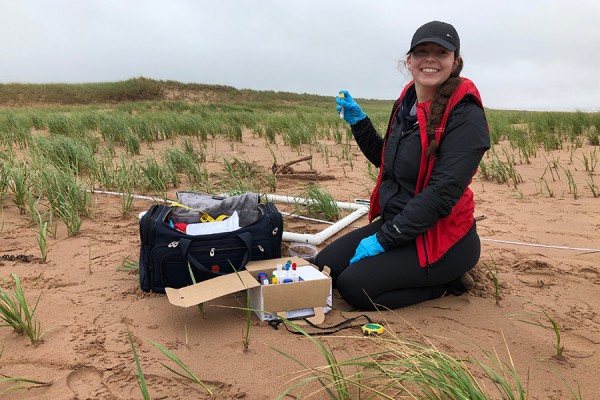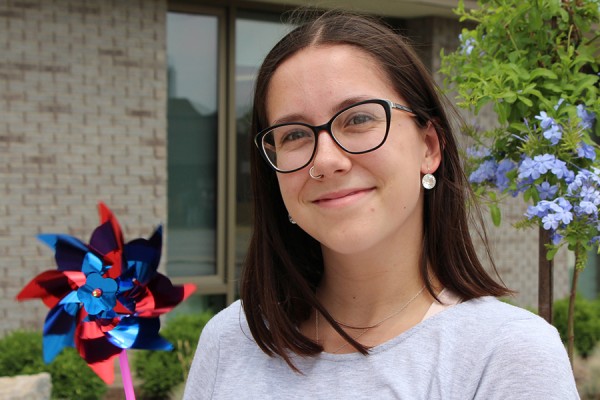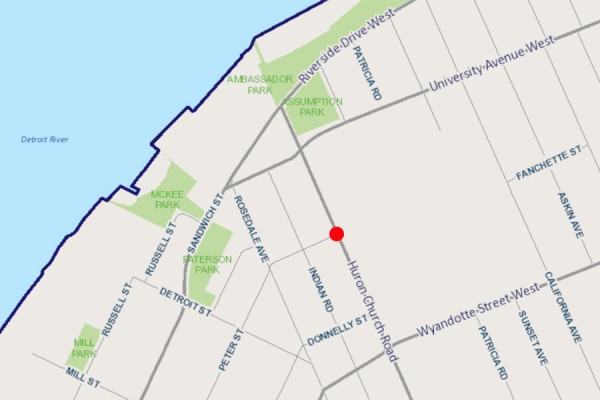 Grad student Brianna Lunardi, a member of the Coastal Research Group, is in Prince Edward Island studying sand dunes and beaches. Here, she is shown taking samples of the sand and vegetation in Stanhope on the island’s north shore.
Grad student Brianna Lunardi, a member of the Coastal Research Group, is in Prince Edward Island studying sand dunes and beaches. Here, she is shown taking samples of the sand and vegetation in Stanhope on the island’s north shore.
Most people associate a day at the beach with playing in the sand and frolicking in the surf.
UWindsor researchers are not most people.
Four graduate students and a post-doctoral fellow from the School of the Environment — members of the Coastal Research Group — are in Prince Edward Island this month, flying drones over the shoreline, and mapping beaches, dunes, and rip currents.
Graduate student Summer Locknick is integrating the physical and social sciences, asking beachgoers about their knowledge of rip currents. She is analyzing how people behave based on their knowledge of beach safety and the location of the dangerous rips.
Using machine-learning techniques, a subset of artificial intelligence, fellow grad student Jake Lehner is developing an automated approach to mapping coastal systems, and has already discovered a new landform.
Brianna Lunardi, another grad student, is studying the morphology of sand dunes and beaches with a view to discovering what controls the height of dunes and what that means in the context of climate change.
Elizabeth George, a new grad student joining UWindsor this fall, is beginning a two-year research project, collecting drone data to determine where beaches end and where dunes begin.
And post-doctoral fellow Phil Wernette is using ground-penetrating radar to analyze the sedimentary structure of coastal systems to determine how dunes evolve.
“The scale and resolution of the research being conducted by the Coastal Research Group at UWindsor has never been done before,” said Chris Houser, dean of science.
Dr. Houser has been studying beaches and rip currents since 2004. Where UWindsor students are taking that research is important for understanding how to protect homes and property from climate change.
“We may lose complete resiliency of our coast as sea levels rise and storm activity changes,” Houser said. “We don’t know how these systems will evolve and that’s what we’re trying to figure out.”
Locknick’s research has the potential to create safer beaches, said Houser.
Her early results show that most people walking onto a beach don’t even notice the green, yellow, or red flags posted by lifeguards denoting what the swimming conditions are on that particular day.
Locknick’s research is also testing what’s called confirmation bias where beachgoers wittingly or unwittingly undertake risky behaviour only because they’ve emerged unharmed from the same behaviour in the past.
It flows out of UWindsor research that shows most drownings in Florida have occurred when yellow flags are posted. Some beachgoers may look at yellow flags not as true warnings, but as over-cautiousness by lifeguards, Houser explained.
Houser’s own research in Pensacola, Fla., in 2008, showed the rip current signs on display there were faulty. Even if people noticed the catchy slogan on the signs — break the grip of the rip — the confusing graphics could lead beachgoers to swim directly into the dangerous currents.
“The outcome of our rip current research is the most satisfying, because at the end of the day, it’s the one that saves lives.”
The research projects on P.E.I. are being funded by the Natural Sciences and Engineering Research Council of Canada and the Marine Environmental Observation Prediction and Response Network. For past coastal research, Houser has secured funding from the National Science Foundation in the United States, the Texas Sea Grant, and the Florida Sea Grant.
Houser is called upon to give expert testimony at inquests into drowning deaths, and his research informs the U.S.’s National Oceanic and Atmospheric Administration and the P.E.I Rip Current Advisory Committee of which he is a member.
In addition to P.E.I, Houser’s research has taken him and his students to Australia, Costa Rica, Texas, Florida, and around the Great Lakes.
“It’s a great opportunity for students,” he said.
─ Sarah Sacheli






